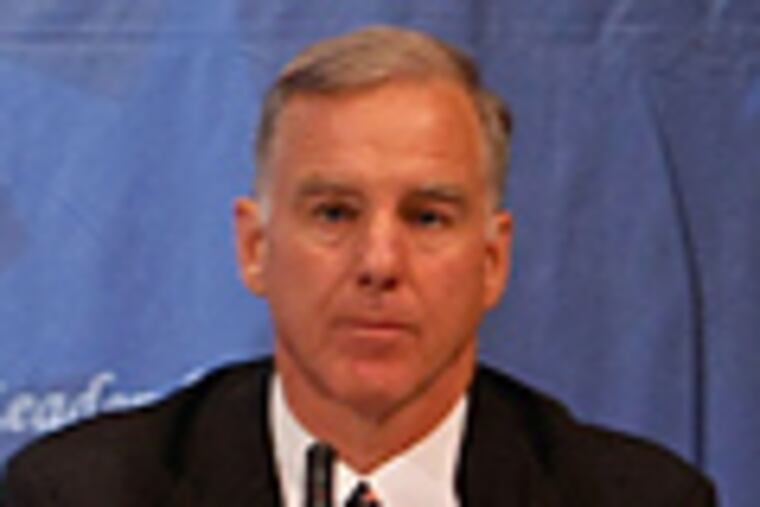Head Strong: Superdelegates' job: Pick a winner
Sen. Barack Obama leads in the Democratic presidential nomination race in both the popular vote and delegate count, but still lacks the magic number to secure the nomination. So there's no shortage of opinion as to what the Democratic Party's superdelegates should do.

Sen. Barack Obama leads in the Democratic presidential nomination race in both the popular vote and delegate count, but still lacks the magic number to secure the nomination. So there's no shortage of opinion as to what the Democratic Party's superdelegates should do.
Take for example the comments of Christine Pelosi, daughter of House Speaker Nancy Pelosi and herself a superdelegate, who recently said: "I think that as a superdelegate my vote shouldn't be more important than that of an entire congressional district, and that's why I'm not going to overturn the verdict of the American people."
Her sentiments are common, but if the job of superdelegates is simply to mirror the "verdict" of the electorate, why have them at all?
So I asked Myron Levine, a political science professor who taught me for several months as part of a program called the Washington Semester at American University. Now on the faculty at Wright State University, he is coauthor of a book called Urban Politics and wrote another called Presidential Campaigns and Elections. Levine gave me the CliffsNotes version of what I first heard from him 25 years ago. He reminded me that to appreciate the proper role of superdelegates, one needs to understand what happened to the party in 1968.
Back then, yes, there were primaries, but the nomination was not determined by a strict calculation of raw votes and a corresponding number of delegates. The actual selection was the domain of party bosses in smoke-filled rooms.
Vice President Hubert Humphrey's nomination in 1968 was a case in point. He was given the party's nod after barely dipping his toe into the primaries. Outraged, the party's vocal, antiwar faction demanded to change the nomination process, in favor of openness, in time for the 1972 campaign.
So in 1972, the role of the party regulars became subservient to the passion of the electorate, resulting in the nomination of Sen. George McGovern, who won a single state - Massachusetts - and lost the popular vote to Richard Nixon by 23 points.
How to avoid such disasters? How to balance the wisdom and standing of party elders - people who had run successfully for office - while not yielding the nomination process entirely to the electorate? That went unresolved until 1982, when a commission under the direction of North Carolina Gov. James Hunt carved out a new kind of delegate.
Democratic congressmen, governors and party leaders would form a stable of unpledged delegates free to support the candidate they deemed best to compete in November - no matter what the voters had decided.
In other words, superdelegates were created to temper the choice voters had made - to overrule it, even, if necessary, to avoid a repeat of the 1972 blowout.
Lanny Davis, a member of the Democratic National Committee and the DNC's Executive Committee, was present when the Hunt Commission created the superdelegate in 1982. (He was also special counsel to President Bill Clinton, and today is a fund-raiser and supporter of Sen. Hillary Rodham Clinton, albeit with no formal role in her campaign. "That way I can't get fired when I say something stupid," he told me.)
Davis confirms that superdelegates "had independent judgment. They were there to make a judgment about who was best able to beat the Republican, notwithstanding the results out of the primary. That was their function, and that was their intent."
That history seems lost today on those who think superdelegates should simply rubber-stamp the victor in a given congressional district or state. Why? Levine suggests that 20 years ago the political climate was more hospitable to such a dominant role for the party leaders. Today, the possibility of an "elite" opinion overturning the will of the people just isn't politically correct.
Today, the Clinton campaign stresses this history as she struggles to keep her presidential campaign alive. Her hopes rest with the superdelegates, to whom she makes the following case: First, they are not beholden to any electorate; second, with a blowout in Puerto Rico, she stands poised to lay claim to the popular vote total; third, Obama is damaged goods for a general election, shown by his poor showing in traditional "blue" states; and finally, the latest Rasmussen and Gallup polls both suggest that Sen. John McCain leads Obama nationally in a prospective general election matchup while Clinton still manages to top McCain.
Bottom line? Superdelegates exist to pick winners. In arguing that Obama is headed for electoral defeat in the fall, Clinton is raising a legitimate consideration for both committed and uncommitted superdelegates. And instead of bending to a certain constituency or delegate count, they should be focused on identifying their party's best shot in November.
To which Levine would add a caveat: Denying Obama the nomination he claims due to his delegate lead could alienate the party's African American base. In that case, the superdelegates may only have changed the name of the losing Democratic candidate.